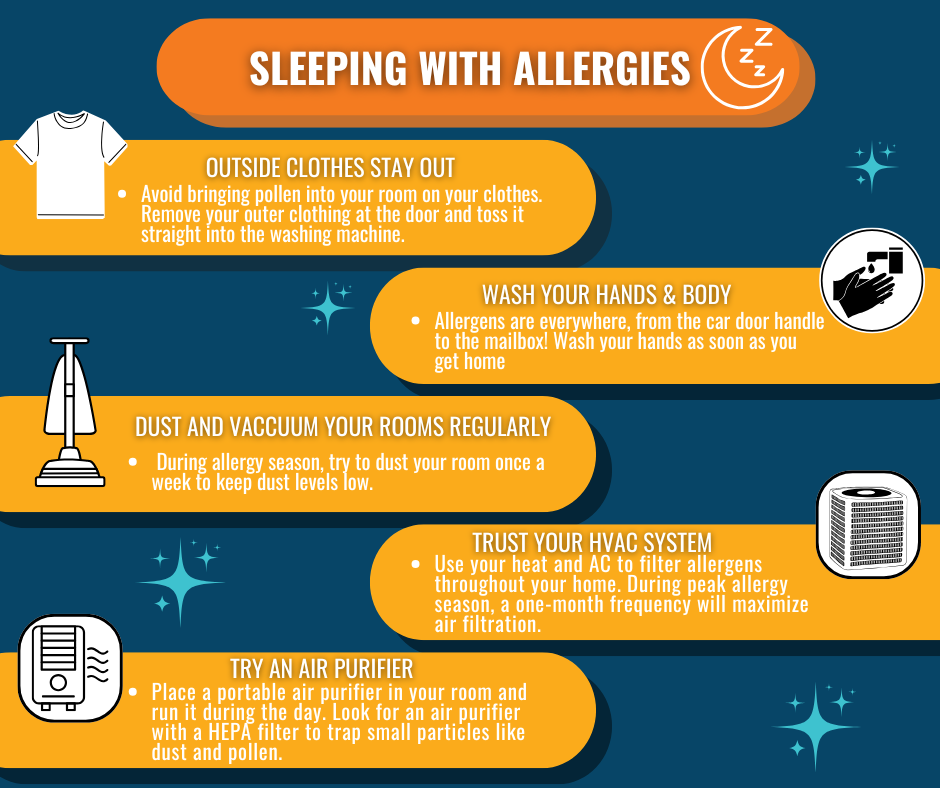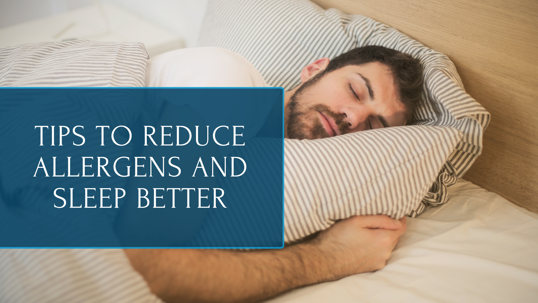Your sleep doesn’t have to suffer during allergy season. With regular cleaning and dusting and a well-maintained HVAC system, you can enjoy a good night’s sleep, even at the height of allergy season.
Learn our top tips for sleeping better during Central Florida’s long-lasting allergy season.
Common Causes of Bedroom Allergies
People who suffer from seasonal allergies fear the arrival of spring blooms, summer hay fever, and fall mold. Despite your efforts to keep them out, pollen and mold spores can still find their way into your home.
Approximately 25% of adults in the US experience seasonal allergies, including:
- Tree pollen
- Grass pollen
- Ragweed
- Mold spores
Most adults are allergic or sensitive to multiple allergens, including a mix of indoor irritants., like dust, pet dander, and mold. If you’re experiencing poor sleep quality year-round, you might be fighting both indoor and outdoor allergens.
Read more: How to Improve Indoor Air Quality on a Budget

Allergies and Sleep: Why It’s So Hard to Get Shut-Eye
You may notice that your symptoms worsen while you sleep. For some individuals, just lying down can make breathing more difficult because of their airway structure.
Allergy symptoms are often more severe at night because of increased exposure to allergens in the bedroom and elevated histamine levels in your body.
How to Sleep Better with Allergies
If you’re experiencing sleep-limiting allergies in the bedroom, follow these tips!
- Outside clothes stay out – People with severe allergies should avoid bringing pollen into their bedrooms on their clothes. When you get home, remove your outer clothing at the door and place it directly into the washing machine.
- Wash your hands – Allergens are everywhere, from the car door handle to the mailbox! Wash your hands as soon as you get home, and avoid touching your mouth, nose, and eyes until your hands are clean. Take a shower if you’ve spent a lot of time outside to remove allergens from your hair and skin.
- Dust your room – Bedrooms accumulate a lot of dust because we spend a lot of time in them. Between sleeping, relaxing, and getting ready for the day, our activity causes bedrooms to collect all our skin cells, hair, and fibers from clothes and bedding.
- Use your HVAC system – Replace your HVAC air filter every one to three months. During peak allergy season, changing it every month will provide the best air filtration. Check your owner's manual or contact Dial Duron Service Co. to see if a HEPA filter is compatible with your system. Additionally, use your heating and air conditioning systems regularly to prevent debris from accumulating while they sit idle.
- Try an air purifier – Place a portable air purifier in your room and run it during the day. Look for an air purifier with aHEPA filter to trap small particles like dust and pollen.
What Is the Perfect Temperature and Humidity for Sleeping?
The EPA recommends keeping your home between 60 and 67 degrees Fahrenheit and indoor humidity between 30% and 50%.
Does Sleeping with a Humidifier Help Allergies?
Using a humidifier to reach the ideal humidity can help alleviate some allergy symptoms, but it is not a universal solution. High humidity levels can worsen allergies, particularly for those who are sensitive to mold and dust.
Rely on Central Florida’s HVAC Pros
Central Florida residents rely on Dial Duron Service Co. for affordable, reliable HVAC maintenance and repairs. Our skilled technicians keep your home’s heating and cooling systems running so you can stay comfortable year-round!
Contact us online or call 321-341-3625 to schedule an appointment today.

